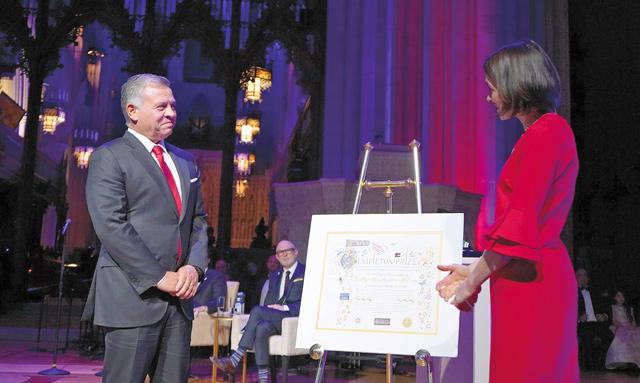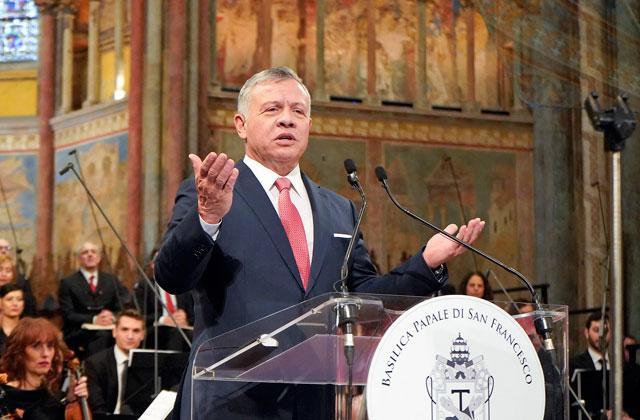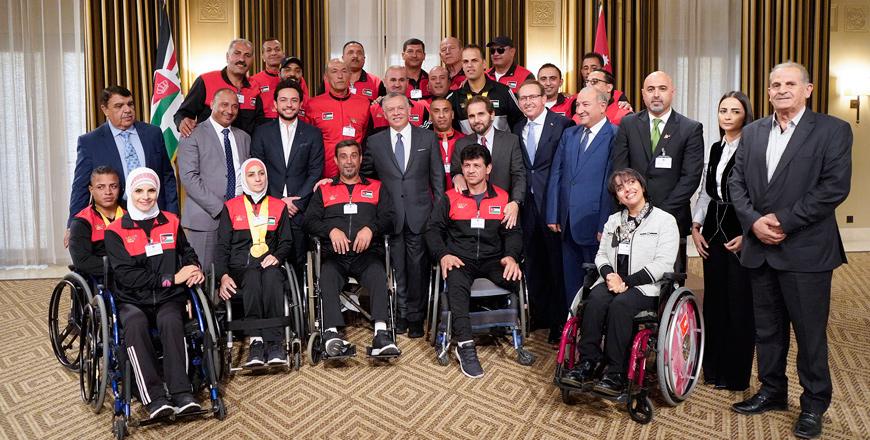You are here
Islam is religion of holistic vision, not cherry-picking to suit political agenda — King
By JT - Nov 15,2018 - Last updated at Nov 15,2018

His Majesty King Abdullah receives the 2018 Templeton Prize from President of the John Templeton Foundation Heather Templeton Dill in Washington, DC, on Wednesday (Photo courtesy of Royal Court)
AMMAN — His Majesty King Abdullah said that Islam is a religion of holistic vision, "not the cherry-picking of verses to suit a political agenda", stressing that all 1.8 billion Muslims around the world are working to defend Islam against the "malignant sub-minority who abuse our religion".
In his speech at a ceremony in Washington, DC, as he accepted the 2018 Templeton Prize on Wednesday, His Majesty underlined Jordan's historic privilege as the land of prophets and its role in maintaining and defending their message of peace and goodness, according to a Royal Court statement.
His Majesty said that he accepts the award on behalf of all Jordanians, because all he is being honoured for "simply carries onward what Jordanians have always done", and that is to live in mutual kindness, harmony and brotherhood.
Expressing his sorrow over the loss of life in the Kingdom in the recent flashfloods, the King added that the Jordanian families grieving for loved ones are "are highest in my mind today".
The King said that "the greater jihad" has nothing to do with the hate-filled fiction promoted by the likes of Daesh or Islamophobes who distort our religion.
"It is, instead, the personal, internal struggle to defeat the ego and the struggle we all share for a world of peace, harmony and love," he added.
He stressed that the noble commandments of loving God and one's neighbour are ones that unite many faiths around the world, including Islam, Christianity and Judaism.
“It is a profound message, calling every one of us to struggle to look beyond ourselves. And this outward insight is the source and hope of all coexistence,” His Majesty said.
When we talk about coexistence, the King noted, no issue is more important than that of Jerusalem, stressing that the city is holy to more than half the world’s population, and with the multi-faith heritage the Holy City holds, Jerusalem must be protected as a “unifying city of peace”.
His Majesty, who has been awarded the prestigious prize in appreciation for his efforts to promote interfaith harmony, safeguard Jerusalem’s Islamic and Christian holy sites and protect religious freedom, announced during the ceremony that a portion of the award’s value will be donated to renovate religious sites in Jerusalem, including the Church of the Holy Sepulchre, while the remaining sum will be devoted to humanitarian, interfaith and intra-faith initiatives, in Jordan and around the world.
UN Secretary General António Guterres said that King Abdullah’s promotion of peace within Islam, and between Muslims and people of other beliefs, has contributed to global peace and progress in many ways, highlighting the Amman Message of 2004 as one of His Majesty’s contributions to this goal.
In remarks during the prize ceremony, Guterres also referred to the King’s scholarly initiatives that aimed to foster mutual understanding and cooperation among Muslims, as well as between Muslims and Christians, such as the Royal Aal al-Bayt Institute and The Common Word initiative, launched by His Majesty in 2007.
“Faith is too often used to divide us. But it should provide pathways for people to come together in their diversity. By seeking religious harmony and understanding within Islam, and between Islam and other religions, His Majesty has courageously demonstrated that belief in a power greater than ourselves can bridge differences, create unity and contribute to peace, stability and security,” the secretary general said.
Guterres also commended the King’s proposal for the World Interfaith Harmony Week, which was unanimously adopted by the UN and is now observed every year around the world, as well as the King’s role in guarding Muslim and Christian holy sites in Jerusalem and his efforts to fund the construction of Christian churches in Jordan and support Christians threatened by Daesh in Iraq and Syria.
As a former high commissioner for refugees, Guterres said he also has great admiration for the Kingdom and its role in hosting of millions of refugees “with a generosity that should be referred to today in a world where — unfortunately — refugees are, so many times, forgotten or even ostracized”.
“King Abdullah has acted upon his responsibility to address the root causes that can undermine social cohesion and create conditions in which extremism can flourish. He has demonstrated what true leadership looks like, in our times and for our world,” Guterres added.
For her part, President of the John Templeton Foundation Heather Templeton Dill said that King Abdullah is a person “shaped by temporal and political responsibilities, yet one who holds the conviction that religious belief and the free exercise of religion are among humankind’s most important callings”.
The president said the founder of the Templeton Foundation, Sir John Templeton, created the prize because he believed that religion is important and under-appreciated in the affairs of humankind and he wanted to honour those who were making significant contributions to human flourishing that spring from deeply held religious convictions.
“In this way, His Majesty embodies the values that inspired my grandfather to establish the Templeton Prize and the John Templeton Foundation and it is a great joy to celebrate His Majesty’s contributions in this ceremony,” Templeton Dill said.
The Amman Message, the Common Word and the United Nations Interfaith Harmony Week stress the moral imperative of understanding the values of peace inherent in all religions, she added.
“We at the John Templeton Foundation cannot think of a more important message of peace and reconciliation for the world to hear and embrace in the 21st century.”
King Abdullah is the first political leader and head of state to receive the Templeton Prize, founded in 1972, and the second Muslim figure it recognises.
Since its launch, the prize has been awarded to 47 international figures, including scholars, philosophers, and leading reformers, such as Mother Teresa, who received the inaugural award in 1973, the Dalai Lama (2012) and Archbishop Desmond Tutu (2013).
His Majesty returned home on Wednesday after a working visit to Washington, during which he received the accolade and held several meetings over regional developments and cooperation, including with US secretary of State Mike Pompeo, UN Secretary General Antonio Guterres and World Bank Group President Jim Yong Kim.
Related Articles
AMMAN — Since the Accession to the Throne, His Majesty King Abdullah has institutionalised a policy of interfaith dialogue, earning the King
Amman — His Majesty King Abdullah on Thursday departed on a working visit to Washington, DC, during which His Majesty will be receiving the
AMMAN — As a pioneer in both financial investment and philanthropy, the late Sir John Templeton spent a lifetime encouraging open-mindedness













